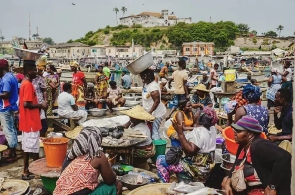For countries like Ghana and Ethiopia, which have a higher inflation differential, growth recovery in 2023 would be accompanied by rising inflation, the World Bank has said in its April 2023 the African Pulse report.
“In those countries, the rising cost of living is already weighing on consumers and investors and may hamper economic growth”.
The report said amid high inflation and weak growth prospects in 2023, the fear of stagflation is rising across some countries in the region.
The report noted that Sub-Sahara African economies as well as the global economy are experiencing an episode of high inflation that is driven by the COVID-19-related lockdowns and supply chain disruptions, and exacerbated by the war in Ukraine, among other factors.
The war in Ukraine, it pointed out, escalated supply chain disruptions further and intensified volatility in energy and commodity prices.
Many central banks across the globe responded by tightening their monetary policies to curb inflation.
For example, the US Federal Reserve has increased its monetary policy rate by 450 basis points since March 17, 2022.
However, inflation declined slowly to 6.4 per cent by January 2023—a rate that is still above the Fed’s 2 per cent inflation target.
The slow disinflationary process can be attributed not only to remaining supply chain issues but also rising wages and higher consumer savings from government stimulus checks.
Further interest rate hikes to curb inflation add more pressure to tighten global financial conditions and elevate the risk of a global economic slowdown, the report indicated.
It said one of the salient features in the current inflationary episode is the increase in food prices— which had started prior to the pandemic—due to pent-up demand as the global economy lifted COVID-19 restrictions and harsh weather conditions.
Many Sub-Sahara African countries have experienced high headline inflation fueled primarily by food inflation.
Nearly three-quarters of the countries in the region with available data for January 2023 recorded a two-digit year-over-year rate of food inflation—with Zimbabwe (264 per cent), Sudan (58.7 per cent), and Ghana (61 per cent) exhibiting the highest rates.
It noted that rising inflation erodes purchasing power, holds back growth, and, if not addressed, leads the government to run the risk of de-anchoring inflationary expectations—with dire consequences for financial markets.
“Many countries have also accumulated mounting debt burdens since the pre-pandemic era. In this context, what are the risks of stagflation in Sub-Sahara African countries, and what are the policies needed to engage in a sustainable growth path with a stable macroeconomic environment?”
“It considers countries at risk of stagflation as those that meet two criteria: (1) their income per capita in 2023 is still below that of 2019 (prior to the pandemic), and (2) the projected average inflation rate in 2023 is higher than the corresponding rate for advanced economies”.
The report said evidence shows that about 38 per cent of Sub-Saharan African countries have a greater risk of stagflation.
“Many countries in this group have also recorded two-digit unemployment rates—particularly Southern African countries, Angola, and Nigeria, among others”.
Countries with a low inflation deviation from advanced countries (say, less than 0.025) show moderate to robust growth under a relatively stable inflationary environment.
Business News of Thursday, 6 April 2023
Source: classfmonline.com

















